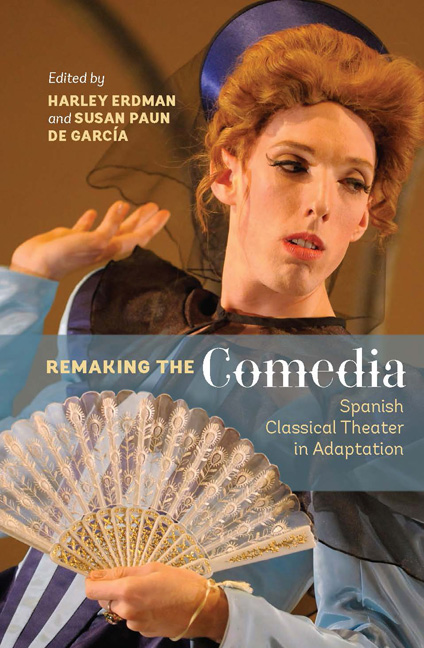Book contents
- Frontmatter
- Contents
- Illustrations
- Contributors
- Preface
- Note to the Reader
- Acknowledgements
- PART I THEORIZING
- 1 Terms and Concepts: The Adaptation of Classical Texts for the Stage
- 2 “Los senderos que se bifurcan:” Adaptation, Appropriation, and the Proliferation of Possibilities
- 3 Interpretative Directing Games for the Golden Age Repertory
- 4 Re-Make, Re-Mix, Re-Model
- PART II SURVEYING
- PART III SPOTLIGHTING
- PART IV SHIFTING
- Play Titles Cited
- Works Cited
- Index
1 - Terms and Concepts: The Adaptation of Classical Texts for the Stage
from PART I - THEORIZING
Published online by Cambridge University Press: 05 December 2015
- Frontmatter
- Contents
- Illustrations
- Contributors
- Preface
- Note to the Reader
- Acknowledgements
- PART I THEORIZING
- 1 Terms and Concepts: The Adaptation of Classical Texts for the Stage
- 2 “Los senderos que se bifurcan:” Adaptation, Appropriation, and the Proliferation of Possibilities
- 3 Interpretative Directing Games for the Golden Age Repertory
- 4 Re-Make, Re-Mix, Re-Model
- PART II SURVEYING
- PART III SPOTLIGHTING
- PART IV SHIFTING
- Play Titles Cited
- Works Cited
- Index
Summary
Adaptation and appropriation … are, endlessly and
wonderfully, about seeing things come back to us in as
many forms as possible.
—Julie Sanders, Adaptation and Appropriation (160)Adaptations seem so common, so natural, so “obvious”
—but are they?
—Linda Hutcheon, A Theory of Adaptation(14)
Research in the area of Spanish early modern drama and theater has evolved in my professional lifetime from emphases on establishing reliable texts and discussing a play's composition and authorship to close readings of plays and applications of the modern and postmodern theoretical approaches to literature that emerged in the last decades of the twentieth century and into the twenty-first. In almost parallel fashion, Comedia scholars have also developed ever-increasing interest and expertise in discussing the performance of classical texts. The foundational studies of researchers such as J. E. Varey, N. D. Shergold, José María Ruano de la Haza, John J. Allen, and José María Díez Borque, who described the performance space, the role of the actor, etc., in the sixteenth and seventeenth centuries, paved the way for performance-oriented approaches of a different type—especially those of Susan Fischer and Matthew Stroud, as well as critical anthologies edited by Louise and Peter Fothergill-Payne, Susan Paun de García and Donald Larson, and Catherine Boyle and David Johnston—which have changed the ways we consider productions of early modern theater in modern times. We have become more performanceliterate after several decades of attending the staging of classical theater in theater festivals (most notably in El Paso, Texas, and Almagro, Spain) and in major cities around the world, especially in Madrid via the Compañía Nacional de Teatro Clásico. Moreover, we have benefited from websites such as Britain's Out of the Wings project (a database intended to bring Spanish-language theater to English-speaking researchers and theater practitioners) and analyses and reviews of performances and festivals in scholarly books and in journals that are both discipline-specific (e.g., Comedia Performance, Gestos, and the Bulletin of the Comediantes) and non- Hispanic (e.g., TDR, PAJ, Journal of Adaptation in Film and Performance, Borrowers and Lenders, and Performance Quarterly).
- Type
- Chapter
- Information
- Remaking the ComediaSpanish Classical Theater in Adaptation, pp. 3 - 12Publisher: Boydell & BrewerPrint publication year: 2015



